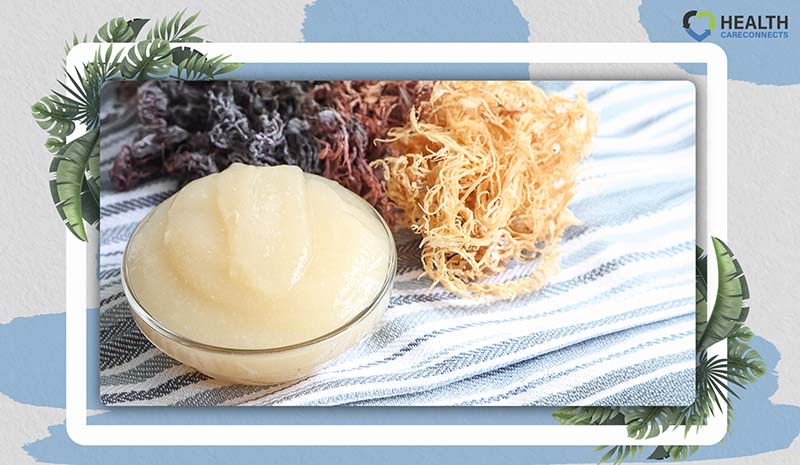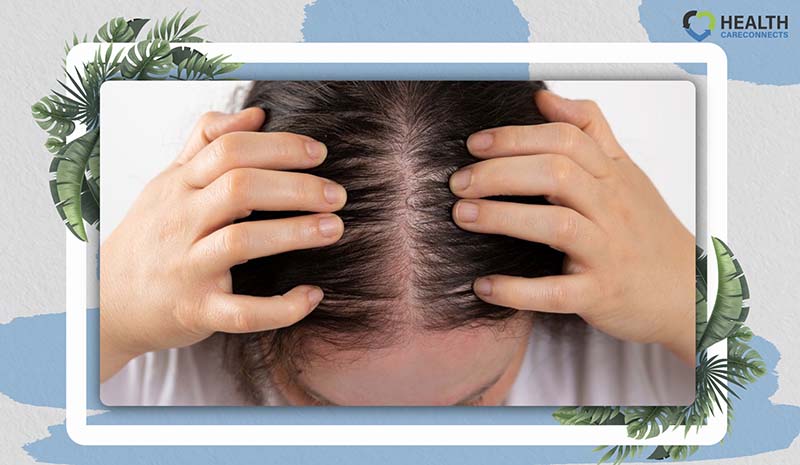If you’re a fan of nourishing your body with natural supplements, you’re likely familiar with sea moss. While many are aware of the numerous health benefits that sea moss provides, there’s much more to this remarkable seaweed than initially apparent.
As a leading organic source of micronutrients, it’s easy to overlook the other extraordinary benefits sea moss offers. For those wondering, “Is sea moss good for hair?” the answer is a resounding yes.
There are several advantages of sea moss for hair that you might not yet know about.
Is Sea Moss Good for Hair?
Many individuals report enhanced hair growth when incorporating Sea Moss into their regimen. While outcomes can vary due to different body chemistries, research indicates that Sea Moss might stimulate hair follicles and promote growth.
Packed with Omega-3 fatty acids, zinc, fucoidan, folic acids, and other beneficial compounds, Sea Moss is a treasure trove for hair care. Its antibacterial, antifungal, and antimicrobial properties, coupled with antioxidants, help protect against UV damage, support hair cell regeneration, and ensure adequate hydration.

Uses of Sea Moss in Supporting Hair
The myriad benefits of sea moss for overall health are similarly advantageous for hair health.
Rich in nutrients, this seaweed can significantly lower the risk of hair damage and enhance the appearance of your locks, making them look healthier and more vibrant. Additional advantages of using sea moss for your hair care routine include:
Enhancing Scalp Health
Sea moss is abundant in antioxidants, crucial nutrients that contribute significantly to overall wellness. These antioxidants are pivotal in supporting skin health through various means, including protecting the skin, aiding in cell growth and metabolism, and facilitating collagen synthesis, essential for maintaining skin elasticity and firmness.
Research has also indicated that sea moss can be effective in treating skin conditions such as eczema, psoriasis, and dandruff. This is likely due to its anti-inflammatory and moisturizing properties, which help to soothe irritated skin and improve hydration levels.

Moisturizing Your Hair
Carrageenan is a key component of Sea Moss, a gel-like substance consisting of special sugar molecules that are indeed edible. This unique type of sugar excels in natural hair styling products due to its ability to bind with water effectively.
Applying carrageenan to your hair attracts water molecules and forms a protective film around each hair strand. This film acts to seal the hair cuticle and enhance the strength of the hair, providing both protection and nourishment.
Furthermore, the beauty of using carrageenan from sea moss in hair care is that this film breaks down easily with shampooing. This characteristic ensures that there is no stubborn buildup, which is often a concern with other hair product ingredients, such as certain silicones, that can leave heavy residues.
Protecting Hair from UV Damage
Sea moss is particularly rich in an antioxidant known as fucoidan. Research has demonstrated that fucoidan can play a crucial role in protecting hair and skin from UV radiation damage.
It achieves this by reducing inflammation and neutralizing free radicals, which are often responsible for cellular damage and aging.
Encouraging Natural Hair Growth
Sea moss is enriched with fatty acids and folic acids, the latter of which are crucial minerals that support skin growth. When applied to hair, folic acids can naturally accelerate the hair growth process by stimulating the scalp and nourishing the hair follicles.

Frequency of Sea Moss Application for Hair
Sea moss gel is generally well-tolerated by most hair types. It is highly nourishing yet remains non-greasy, making it an ideal addition to any hair care regimen. It’s recommended to use sea moss in your hair 2-3 times a week for best results.
Initially, you can start with a sea moss hair mask once a week. Monitor how your hair responds and gradually adjust the frequency of use. This approach allows you to customize your hair care routine to suit your specific hair needs optimally.
Vitamins and Minerals Present in Sea Moss
Sea moss has gained popularity as a supplement aimed at enhancing overall health and well-being. This plant is loaded with antioxidants and a wide spectrum of vitamins including A, C, E, K, and B.
Given its composition of 92 essential minerals such as iron, zinc, magnesium, and potassium, it’s unsurprising that new benefits of sea moss for hair are continually being discovered.
Can Consuming Sea Moss Help Promote Hair Growth?
Eating sea moss, whether in gel form or raw, contributes to hair growth. When you ingest sea moss, your body absorbs its nutrients and distributes them to the areas that need them most, including the scalp and hair follicles.
The condition and appearance of our hair are greatly influenced by our diet. Integrating sea moss into a healthy diet not only improves hair health but also enhances skin quality and overall well-being. Regular consumption can provide a holistic boost to your body’s health, reflecting in vibrant skin and lustrous hair.
Utilizing Sea Moss in Haircare Regimens
The use of sea moss for hair can vary based on personal preference. You can consume it orally in gel form, create DIY hair masks, or use hair care products like shampoos and conditioners that contain sea moss.
For those who prefer a more natural, do-it-yourself approach, creating a nutrient-rich sea moss mask at home is a straightforward process:
- Begin with dry sea moss and boil it until it reaches a gel-like consistency, or use a jar of pre-made sea moss gel.
- Take two to three tablespoons of the sea moss gel (adjust according to the length and thickness of your hair) and place it in a mixing bowl.
- Add a few drops of your preferred hair oil, such as olive oil, almond oil, or avocado oil. Stir until you achieve a smooth consistency.
- Apply this mixture evenly from the scalp to the ends of your hair.
- Leave the mask on for 20 to 30 minutes before washing it out with a gentle shampoo.
Store any leftover mixture in an airtight jar to maintain its freshness. For optimal results, apply this sea moss hair mask several times a week.
Potential Side Effects of Using Sea Moss
Sea moss is a natural compound and generally does not cause significant side effects. However, like with any substance, excessive use can lead to adverse effects. Possible side effects of sea moss include:
- It has a high iodine content, which, if consumed excessively, could contribute to thyroid dysfunctions such as hypothyroidism.
- Individuals with sensitive skin or those allergic to seafood might experience allergic reactions.
- It can sometimes lead to gastrointestinal discomfort or issues.
Can You Leave Sea Moss in Your Hair Overnight?
You can leave sea moss in your hair overnight, but it may not be necessary. The gel typically begins to dry after 20-30 minutes, and beyond this point, your hair won’t absorb additional nutrients.
To fully harness the benefits of sea moss for your hair, it’s more effective to apply a 20–30-minute hair mask twice a week.
This approach is more efficient than leaving the gel on for an extended period, such as overnight, as it avoids potential discomfort and ensures that the nutrients are maximally utilized during the time when the gel is most active.

Conclusion
Sea moss is frequently featured in skin and hair care products. Irish sea moss is known for promoting natural hair care, soothing scalp irritation, delivering essential nourishment, strengthening hair, reducing hair fall, and enhancing shine.
Although it is also believed to promote hair growth, more research is required to substantiate this claim. If you’re wondering, “Is sea moss good for hair?” give it a try to achieve soft, smooth hair.
For more insights on maintaining healthy hair and overall wellness, explore our other blogs on Health Connect.

Dr. Joyce Slater: Your Guide to Informed Health Choices
Dr. Joyce Slater shines as a distinguished expert in the field of nutrition and public health. Contributing her vast expertise to HealthConnectbc, she embodies a deep-seated passion for enhancing public well-being. As a respected figure in her field. Dr. Slater’s academic journey and professional achievements are nothing short of inspirational.
Holding a significant position as a researcher and educator, Dr. Slater has delved deeply into the intricacies of food literacy and nutritional science. Her work, prominently featured in numerous esteemed scientific publications, underscores her dedication to expanding our understanding of food’s role in health and society.
At the heart of Dr. Slater’s professional ethos is a profound desire to positively impact individual lives through education and research. She often says, “Empowering people with the knowledge to make healthier choices is the most rewarding aspect of my work.” This principle is the cornerstone of her involvement with HealthConnectbc, where she strives to provide reliable and practical health advice.
Dr. Slater’s contributions to HealthConnectbc are multifaceted: academically, she offers insights into the complex world of nutrition and health, enhancing both public understanding and professional practices. Additionally, she is instrumental in guiding and inspiring the next generation of health professionals, thus fostering future excellence in the field.
Juggling rigorous research with her educational duties, Dr. Slater demonstrates an unwavering commitment to her profession. Her approachable nature and genuine concern transcend the confines of academia, touching the lives of everyone she interacts with. Dr. Slater looks forward to continuing her journey of discovery and education, dedicated to the ongoing improvement of public health and nutrition.
At HealthConnectbc, Dr. J. Slater is not just a contributor; she is a guiding light, dedicated to enlightening and motivating individuals towards a healthier and more informed lifestyle.
PUBLISHED ARTICLES
- Food literacy competencies: A conceptual framework for youth transitioning to adulthood (2018)
- Self-perceived eating habits and food skills of Canadians (2016)
- Challenges to acquiring and utilizing food literacy: Perceptions of young Canadian adults (2016)
- Socio-demographic and geographic analysis of overweight and obesity in Canadian adults (2009)
- Sustainable well-being: Concepts, issues, and educational practices (2014)

